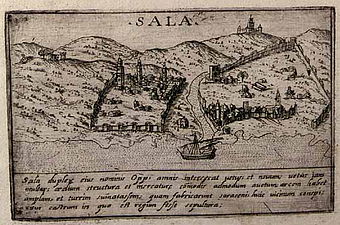Republic of Salé
Republic of Salé | |
|---|---|
| 1619–1627 | |
 Rabat-Salé, where the republic was located | |
| Capital | Salé |
| Common languages | Arabic, Dutch, English, Spanish, French |
| Government | Corsair Republic |
• 1619-1627 | Jan Janszoon |
| History | |
• Established | 1619 |
• Disestablished | 1627 |
The Republic of Salé was an independent corsair city-state on the Moroccan coast. It was a major piratical port during its brief existence in the 17th century.
History

The port city of Salé was a walled city which acted as the chief port and commercial center of medieval Morocco. During the 16th century and into the seventeenth, it became home to many religious refugees from Spain, and attracted the attention of Barbary pirates. The gated harbor was extremely desirable to the pirates. It was a port of call for European traders, and home to many artists, intellectuals, and religious leaders. It ended up being controlled by the Sultan of Morocco, after 1668, when Moulay al Rashid finally vanquished the Dilaites.[1]
Independence
In 1619, the infamous Salé Rovers, a dreaded band of Barbary pirates, declared Salé to be an independent republic free from the Sultan. They set up a government that consisted of 14 pirate leaders, and elected one as their President, who would also serve as the Grand Admiral of their navy. Their first President and Grand Admiral was Jan Janszoon, who led until 1627.[2]
Siege by Zidan Abu Maali
In 1624, the Moroccan Sultan Zidan Abu Maali attempted to reclaim sovereignty of Salé by laying siege to it, but his efforts were eventually repelled. To obtain some satisfaction of sovereignty over the area, he appointed Salé's President as his acting Governor of the area, although it was only ceremonial.[3] The republic would pay the Sultan for his non-interference in their future affairs.[4]
Wealth

The republic became very prosperous and wealthy because of their main sources of income—piracy and shipping. Plundered gold, silver, spices, silks, fabrics, slaves, and many other items of value were brought back to the city-state by the pirates after raids on European shipping vessels and towns. Janszoon was credited for the business growth in the republic because of his intelligence and courage. Between 1618-1626, it was estimated that the pirates operating out of the Bou Regreg corsair republics, which included Salé and Rabat, plundered 6,000 prisoners and £15 million worth of goods, which if based on 2% inflation starting in 1750, would be equivalent to over £2 billion today.[5][6]
Republic of Bou Regreg
In 1627, following a heated political situation, Janszoon left for Algiers, and Rabat and Salé merged to form the Republic of Bou Regreg. During this period much of the profit returned to the republic was eventually absorbed by the government, leading to its decline. In 1641, the zawiya of Dila, which controlled much of Morocco, imposed a religious hegemony over Salé and its parents republic.[7] By the early 1660s, the republic was embroiled in civil war with the zawiya, and eventually Sultan Al-Rashid of Morocco of the Alaouite dynasty, who still rule Morocco into the 21st century, would seize the republic by force, ending its independence.[5]
Popular culture
The character Robinson Crusoe, in Daniel Defoe's novel by the same name, spends time in captivity of the local pirates and at last sails off to liberty from the mouth of the Salé river.[8]
References
- ^ Roger Coindreau, 2006, p. 53
- ^ "Murad Reis", Pirate Utopias, p. 97, Retrieved 30 September 2009.
- ^ "Murad Reis", p. 98
- ^ "Salé Rovers", The story of the Barbary corsairs, p. 191, Retrieved 30 September 2009.
- ^ a b "Salé", Cities of the Middle East and Africa, p. 306, Retrieved 30 September 2009.
- ^ "UK Inflation Calculator", What's The Cost, Retrieved 30 September 2009.
- ^ "Class/social stratification in Islam", History and underdevelopment in Morocco, p. 43, Retrieved 30 September 2009.
- ^ "Robinson's Captivity at Sallee", The life and surprising adventures of Robinson Crusoe, p. 14, Retrieved 30 September 2009.
Bibliography
- Roger Coindreau (2006). Les Corsaires de Salé. Eddif. ISBN 9789981896765.
